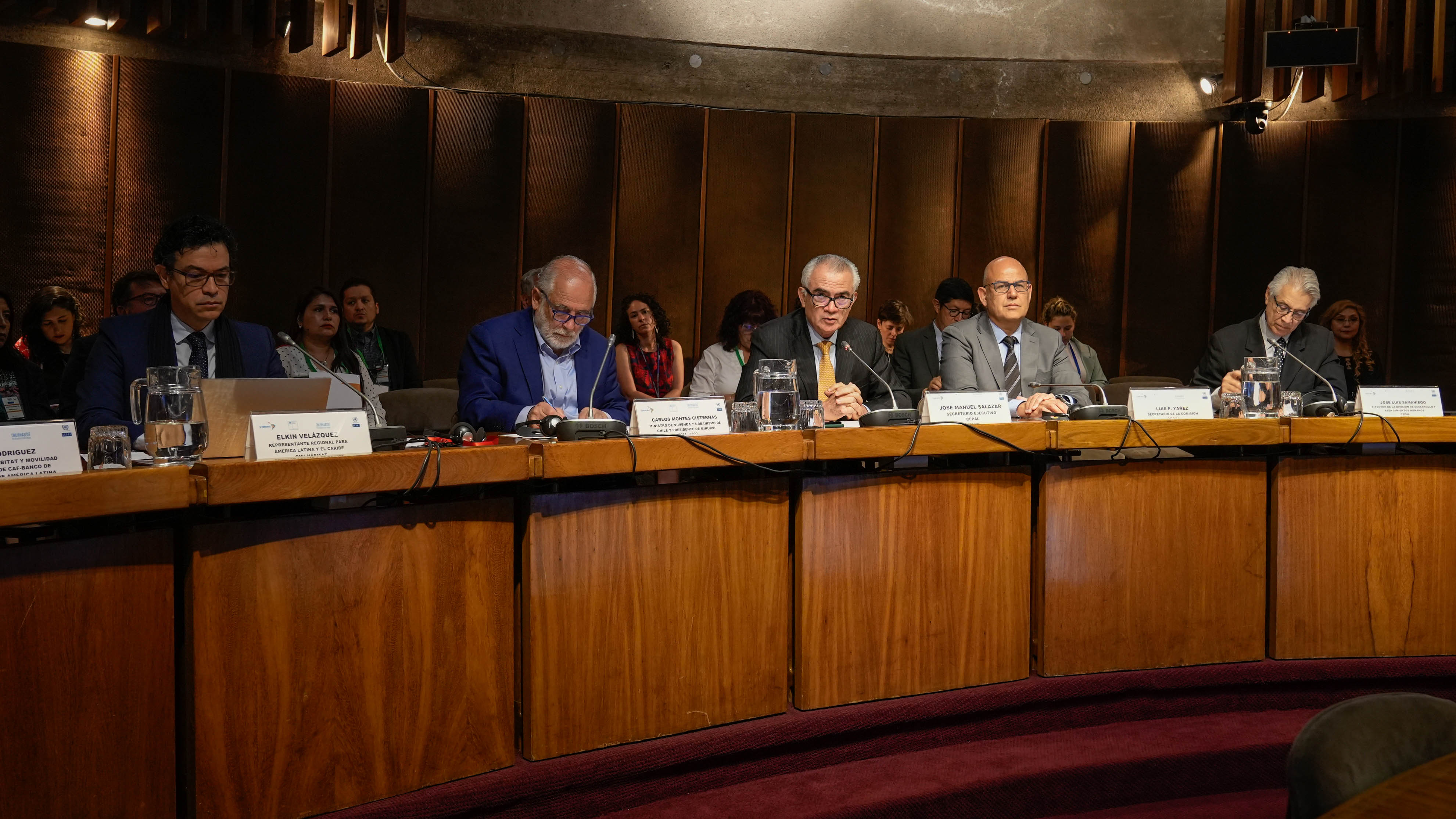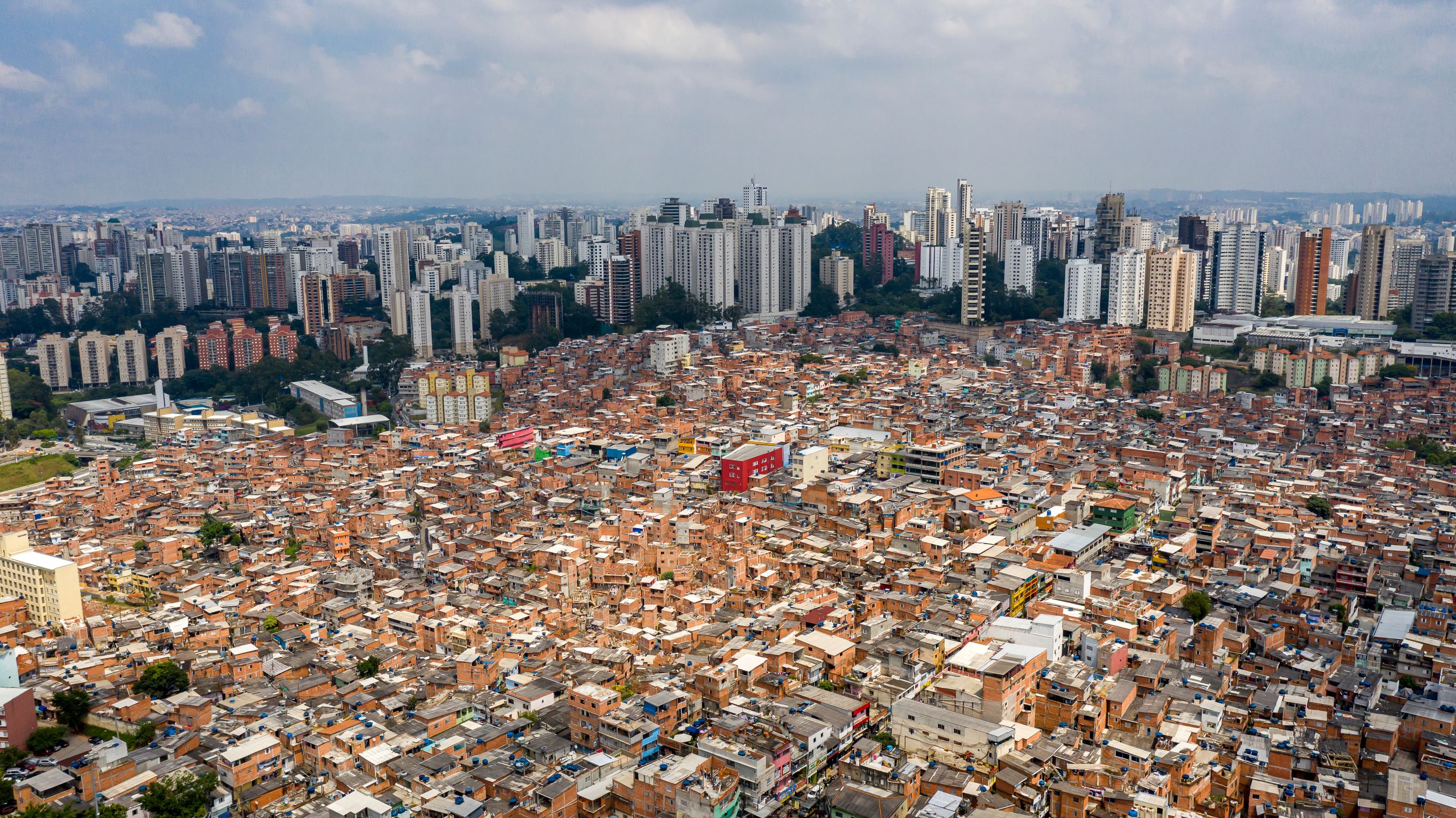Housing and the City are Engines for Economic Reactivation and for Narrowing Social and Environmental Gaps and are Instruments for a Transformative Recovery
Work area(s)
The XXXI Assembly of MINURVI was inaugurated today at ECLAC’s headquarters in Santiago, Chile.

In Latin America and the Caribbean, the most urbanized developing region on the planet, housing and the city are engines for economic reactivation and for narrowing social and environmental gaps and are instruments for a transformative recovery, according to the authorities gathered at the XXXI General Assembly of the Forum of Ministers and Highest Authorities of Housing and Urbanism of Latin America and the Caribbean – MINURVI, which was inaugurated today at the headquarters of the Economic Commission for Latin America and the Caribbean (ECLAC) in Santiago, Chile.
The meeting was inaugurated by Carlos Montes, Minister of Housing and Urban Planning of Chile, the country that is serving as President of the MINURVI Forum (2021-2022), and it featured the participation of José Manuel Salazar-Xirinachs, Executive Secretary of ECLAC; Elkin Velázquez, Regional Representative for Latin America and the Caribbean of the United Nations Human Settlements Programme (UN-Habitat); Georgiana Braga-Orillard, Representative in Chile of the United Nations Development Programme (UNDP); Reina Irene Mejía, Interim President of the Inter-American Development Bank (IDB); and Emil Rodríguez, Director of Habitat and Sustainable Mobility of CAF-Development Bank of Latin America.
In his opening remarks, Minister Carlos Montes emphasized that the main value of spaces like the MINURVI Forum “is to build capacity to question the city in order to transform it, to rethink how we want to experience it and also be capable of allowing other ways of making cities.”
“We want to call for working to forge a social compact in which cities are politically and culturally embraced as a substantial place for exercising rights and building a quality democracy, for building a healthier and safer relationship with the environment and as a place in which we can reconstruct our society and build democracy, and better-quality development,” he affirmed.
Meanwhile, José Manuel Salazar-Xirinachs, ECLAC’s Executive Secretary, recalled that Latin America is the most urbanized developing region on the planet, with 82% of its population living in urban areas, with 8 cities of more than 5 million people and 45 cities that surpass 1 million inhabitants.
Despite their importance, he warned, the resources allocated by the central government to the housing sector declined on average in the region to the equivalent of 0.61% of GDP, below the level recorded a decade ago.
The United Nations regional commission’s highest authority underscored that housing can generate reactivation and dynamism for economic activity and employment, in a framework of sustainability. He noted that ECLAC has estimated that a 1% increase in construction sector growth leads to a 0.07% expansion in the growth rate of GDP per capita.
“It is feasible, with inspiration from the big push for sustainability, to rebuild the urban economy within a new scenario that would foster greater productivity, emphasizing the move towards more sustainable and more equitable urban economies that are better aligned with the Paris Agreement and the 2030 Agenda,” he stated.
José Manuel Salazar-Xirinachs specified that the cost of construction per square meter rose by 23% between June 2021 and January 2022, an increase that has a serious regressive effect that works against the possibility of purchasing, building or improving housing solutions.
“If on top of this, we add high levels of poverty, labor informality and the deceleration of mortgage financing, we conclude that the likely scenario for the coming years is that of an expansion of precarious settlements in our region, beyond the 17.7% of the urban population that was already living in marginal neighborhoods as of 2020,” he said.
The senior United Nations official stressed that land constitutes societies’ greatest asset, which is why it is critical that increases in its value – fundamentally as a result of public investment and regulation – be shared with society, as established in the New Urban Agenda.
“Cities must become instruments for redistribution and inclusion, ensuring access to services and quality public spaces with security. The location of housing and the role of sustainable mobility is critical,” Salazar-Xirinachs concluded.
Elkin Velázquez, Regional Representative of UN-Habitat, meanwhile, emphasized that Latin America and the Caribbean has been prolific in terms of new proposals that translate the new urban development agenda into concrete, transformative deeds, which offer hope but must be carried out on a bigger scale.
Georgiana Braga-Orillard, UNDP’s Representative in Chile, urged for putting people at the center of urban development solutions and promoting inclusive communities. “This will be critical for achieving inclusive and sustainable growth and confronting the inequalities that affect our societies,” she said.
Meanwhile, Reina Irene Mejía, the IDB’s Interim President, indicated that cities are the heart of our countries and contribute with more than 70% of regional GDP; however, 2 out of every 5 inhabitants live in precarious housing, and 1 in 5 lives in informal settlements. “This is unacceptable and must change,” she declared.
Emil Rodríguez, CAF’s Director of Habitat and Sustainable Mobility, emphasized that supporting the financing of adequate housing is a structural issue for our new administration. “MINURVI is the right place for working on scale and promoting a new urban planning vision of proximity,” he indicated.
The MINURVI Forum is the space for intergovernmental coordination and cooperation among the region’s countries in the area of sustainable development of human settlements.
It is made up of the Ministers of State and other government officials who have authority, in their respective countries, over matters related to housing and the sustainable development of human settlements. This entity was created in 1992 and its first declaration was made in the city of Santiago, Chile.
Since December 2020, ECLAC and UN-Habitat have jointly served as the Technical Secretariat of the MINURVI Forum.
The XXXI Assembly will continue on Tuesday, December 6 with a closed meeting in which authorities will elect MINURVI’s new executive committee and will issue a declaration on the topics addressed during the meeting.
Related content

Progress on the 2030 Agenda Will be Decided in Cities
Progress on the 2030 Agenda Will be Decided in Cities Latin America and the Caribbean is the world's most urbanized developing region. The United Nations Secretary-General, António Guterres, has said…
Related link(s)
Country(ies)
- Latin America and the Caribbean
Contact
Public Information Unit
- prensa@cepal.org
- (56 2) 2210 2040